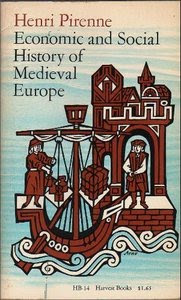Henri Pirenne, "Economic and Social History of Medieval Europe"
Harcourt, Brace and Company | 1937 | ISBN: 0156275333, 0415377935, 1150744707, B0006ANV2I | 243 pages | PDF | 7,8 MB
Harcourt, Brace and Company | 1937 | ISBN: 0156275333, 0415377935, 1150744707, B0006ANV2I | 243 pages | PDF | 7,8 MB
A great Belgian historian recounts the economic and social evolution of Western Europe from the end of the Roman Empire to the mid-fifteenth century. Translated by I. E. Clegg.
Summary: Impressive work!
Rating: 5
Pirenne's book first appeared in print in 1933, so I have to admit I was a little leery about reading it even though I have an interest in feudal economics. I was concerned that it would be a stuffy tome that was written in a dense and archaic academic style. To my surprise, this book is an extraordinarily good read, most interesting, and very informative. And unlike many books on this subject, a casual reader can be assured that a master's level background on the subject is not necessary to read this book.
Picking up at the end of the Roman Empire and running through approximately the middle 1500s, Pirenne tackles the full spectrum of economic and sociological issues as they evolved throughout the Middle Ages in Europe. Specifically, he relates how commerce was revived after the break-up of the economic and cultural stability that existed in the ancient world. Concepts such as the re-issuance of a currency, the rebirth of a money economy, rediscovery of credit, and how urban industry developed are covered and explained in detail. This is a very complete picture of economic and sociological circumstances that existed during the middle ages, as you are likely to see.
Pirenne takes the reader on a journey that attempts to plug the Medieval Period knowledge gap with a detailed explanation of economic development. Geographically (and culturally) he is able to discuss developments throughout all of Europe, from the Mediterranean to the North Sea. If you are interested in learning more about conditions in Europe during the Middle Ages and want a fuller understand of how the western economic system developed, pick up this book
Summary: Masterful explanation of Economics during the Middle Ages
Rating: 4
Pirenne's book first appeared in print in 1933, so I have to admit I was a little leery about reading it even though I have an interest in feudal economics. I was concerned that it would be a stuffy tome that was written in a dense and archaic academic style. To my surprise, this book is an extraordinarily good read, most interesting, and very informative. And unlike many books on this subject, a casual reader can be assured that a master's level background on the subject is not necessary to read this book.
Picking up at the end of the Roman Empire and running through approximately the middle 1500s, Pirenne tackles the full spectrum of economic and sociological issues as they evolved throughout the Middle Ages in Europe. Specifically, he relates how commerce was revived after the break-up of the economic and cultural stability that existed in the ancient world. Concepts such as the re-issuance of a currency, the rebirth of a money economy, rediscovery of credit, and how urban industry developed are covered and explained in detail. This is a very complete picture of economic and sociological circumstances that existed during the middle ages as you are likely to see.
Pirenne takes the reader on a journey that attempts to plug the Medieval Period knowledge gap with a detailed explanation of economic development. Geographically (and culturally) he is able to discuss developments throughout all of Europe, from the Mediterranean to the North Sea. If you are interested in learning more about conditions in Europe during the Middle Ages and want a fuller understand of how the western economic system developed, pick up this book
Download
Not all books on AvaxHome appear on the homepage.
In order not to miss many of them follow ebooks section (see top of each page on AH)
and visit my blog too :)
In order not to miss many of them follow ebooks section (see top of each page on AH)
and visit my blog too :)
| High Speed Download |



















0 comments:
Post a Comment